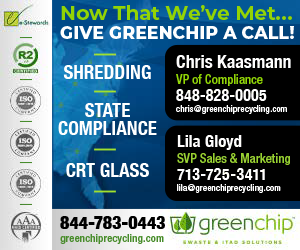Geomega Resources and NeoCtech will both receive funding through NGen’s Global Innovation Cluster grant program | Zerbor/Shutterstock
Canadian industry-led nonprofit NGen awarded 86.7 million Canadian dollars ($64.2 million US dollars) in grants for 15 advanced manufacturing projects in Canada, including two rare-earth magnet recyclers.
Geomega Resources and NeoCtech will both receive funding through NGen’s Global Innovation Cluster grant program, according to a press release. Geomega Resources is based in Boucherville, Quebec, and NeoCtech is based in Montreal.
In the past, Geomega has also received funding from NGen for a rare earth recycling demonstration plant.
In a 2020 “In My Opinion” article for E-Scrap News, Geomega CEO and president Kiril Mugerman noted that Geomega does not handle e-scrap directly but rather works with recyclers that “do not have viable buyers of their magnet stream from their factories, and, instead, are allowing the magnets to get mixed with the metal scrap.”
Between 2019 and 2023, NGen has helped fund 165 Global Innovation Cluster projects with 370 industry partners and 311 research groups across Canada.
Jayson Myers, CEO of NGen, said in the press release that the “Innovation Cluster model is working – and the results speak for themselves.”
“Our role as an innovation catalyst is only possible because of the commitment from our industry and ecosystem partners and the support of the federal government’s Global Innovation Cluster program,” Myers added.

ITAD company AER Worldwide’s newest location in Hillsboro, Oregon, brings the company closer to existing clients and opens new doors in the “Silicon Forest.”
A global analysis from the United Nations found that electronics and electrical equipment are reaching end of life at a quantity and speed that is far outpacing the recycling sector’s capacity to collect and process that material. Still, the global collection rate is on the rise.
Nine major fires were publicly reported at electronics recycling facilities in the U.S. and Canada last year, up from five the year before, according to an annual review of media coverage conducted by fire protection firm Fire Rover.
At a Portland, Oregon-area transfer station, site superintendent Matt Tracy has noticed smaller lithium-ion batteries often behave like fireworks when they go into thermal runaway: They move erratically and can even become projectiles.
There are over 25 bills establishing the right to repair consumer items in play across the U.S., and more than a dozen of those cover consumer electronics.
Metal smelter and recycler Boliden, a major consumer of printed circuit boards, saw lower revenues in 2023 but used slightly more recycled materials.
A technology manager with the U.S. Department of Energy said improving e-scrap management fits squarely within the federal government’s material sourcing and climate goals. That’s why the agency has launched a new funding and technical assistance opportunity targeting electronics recovery.
Copyright 2022, Resource Recycling, Inc About | Privacy | Contact
Sustainably hosted on wind powered servers by Mobius Intelligent Systems.

Recent Comments